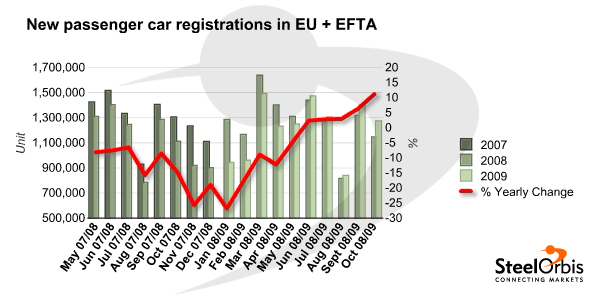According to the data released by the European Automobile Manufacturers' Association (ACEA) on November 16, in October a rise of 15.8 percent in new car registrations recorded in Western Europe and a drop of 36.9 percent seen in new car registrations in the new European Union member states resulted in an overall growth of 11.2 percent in the European (EU-27 plus EFTA) new car market, compared to a market decrease of 14.4 percent in October 2008. All comparisons are on year-on-year basis.
In the January-October period of this year, new car registrations in the European market declined by five percent year on year, amounting to 12,206,381 units.
In Western Europe, new car registrations totaled 1,200,861 units in October, increasing by 15.8 percent compared to the same month last year, mostly due to an increase in the major markets and supported by fleet renewal incentives. In October, British new car registrations expanded by 31.6 percent, Spanish registrations by 26.4 percent, German figures by 24.1 percent, French figures by 20.3 percent, while Italian registrations rose by 15.7 percent, all compared to October 2008. New car registrations also increased in Portugal by 3.5 percent and in Austria by 2.7 percent.
In the first ten months of the current year, new car registrations in Western Europe declined by three percent year on year, reaching 12,206,381 units. A rise of 25.9 percent was recorded in Germany, a rise of 4.2 percent was observed in France and an increase of 6.3 percent in Austria. Meanwhile, the demand for new cars decreased in Spain by 24.4 percent, in the UK by 12.3 percent and was down 3.9 percent in Italy.
In the new EU member states, new car registrations dropped by 36.9 percent year on year in October. The Czech Republic was the only country to post growth, with an increase 8.8 percent. Elsewhere, the downturn ranged from 8.4 percent (Poland) to 81.6 percent (Latvia).
In the January-October period, the overall decline was 29.6 percent for the new EU member states, compared to the corresponding period of the previous year. Slovakia, the Czech Republic and Poland saw their markets expand by 13.5 percent, 8.1 percent and 0.6 percent respectively, while all others contracted sharply.
